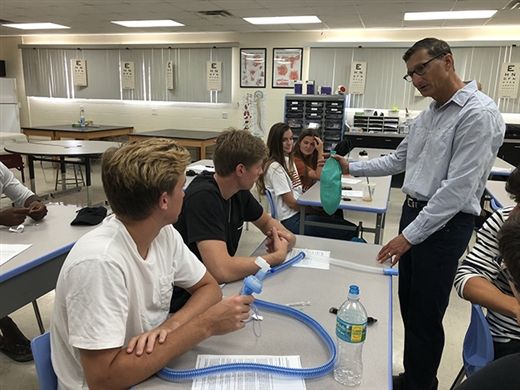

Dr. Jay Epstein, Anesthesiologist, Visits the Center for Medical Science
Source/Author: Kim Bastas '18
May 17, 2018
Dr. Jay Epstein '84, a Shorecrest parent and alumnus, visited Mrs. Peck’s Intro To Medical Sciences class. Dr. Epstein is an anesthesiologist at Mease Countryside Hospital and has been practicing anesthesiology for more than 20 years. He also has a specialty in critical care. With the help of numerous tools and pieces of equipment that he brought from the hospital, Dr. Epstein was able to explain his work day and go into depth about his specific role in the OR.
Every day, he wakes up and arrives at the hospital about 45 minutes before the time of the surgery. This allows him enough time to meet with the patient and prepare the OR. In the OR, one of Dr. Epstein’s duties is to manage and control the patient’s vital signs (blood pressure, heart rate, oxygen level, respiratory rate and brain waves). He explained the four types of anesthesia (general, local, spinal/epidural and regional) and what situation each one would be used. To explain the epidural anesthesia, he used the equipment that he brought and demonstrated on one of the classroom's mannequins. Students were able to pass around all of the tools that he uses to intubate and give patients anesthesia.
Every day, he wakes up and arrives at the hospital about 45 minutes before the time of the surgery. This allows him enough time to meet with the patient and prepare the OR. In the OR, one of Dr. Epstein’s duties is to manage and control the patient’s vital signs (blood pressure, heart rate, oxygen level, respiratory rate and brain waves). He explained the four types of anesthesia (general, local, spinal/epidural and regional) and what situation each one would be used. To explain the epidural anesthesia, he used the equipment that he brought and demonstrated on one of the classroom's mannequins. Students were able to pass around all of the tools that he uses to intubate and give patients anesthesia.
Dr. Epstein also shared about his medical school experience and gave advice on entering the medical field. He suggested that students take their time while undergrads to study things other than medicine because they will have the rest of their lives working in the medical field. He also explained that one of the most important things about being an anesthesiologist is the ability to communicate and be a good, nice person. "While medical school can teach you about medicine," he explained, "it cannot teach you how to be kind and communicate with patients and their families."
View more phtos from his visit here.



















.png&command_2=resize&height_2=85)




